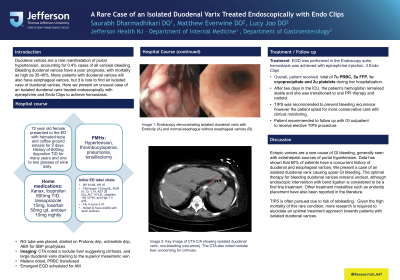Monday Poster Session
Category: Interventional Endoscopy
P2305 - A Rare Case of an Isolated Duodenal Varix Treated Endoscopically With Endo Clips
Monday, October 23, 2023
10:30 AM - 4:15 PM PT
Location: Exhibit Hall

Has Audio
- SD
Saurabh Dharmadhikari, DO
Jefferson Health
Stratford, NJ
Presenting Author(s)
Award: Presidential Poster Award
Saurabh Dharmadhikari, DO1, Matthew Everwine, DO2, Lucy Joo, DO2
1Jefferson Health, Stratford, NJ; 2Jefferson Health, Cherry Hill, NJ
Introduction: Duodenal varices are a rare manifestation of portal hypertension, accounting for 0.4% cases of all variceal bleeding. Bleeding duodenal varices have a poor prognosis, with mortality as high as 35-40%. Many patients with duodenal varices will also have esophageal varices, but it is rare to find an isolated case of duodenal varices. Here we present an unusual case of an isolated duodenal varix treated endoscopically with epinephrine and Endo Clips to achieve hemostasis.
Case Description/Methods: A 72 year old female presented to the ED with hematochezia and coffee ground emesis for 2 days. She reports a history of 600mg Ibuprofen TID for many years, and a glass of wine daily. Admission labs showed BP 81/58, HR 97, INR 1.43, fibrinogen 152mg/dL, BUN 51, Cr 1.14, AST 29 IU/L, ALT 18 IU/L, platelets 146 10^9/L and Hgb 7.5 g/dL. Her Fib 4 score was 3.47. A NG tube was placed and she was initiated on pantoprazole and octreotide IV drips. CTA noted a nodular liver suggesting cirrhosis, and large duodenal varix draining to the superior mesenteric vein. EGD was performed showing fresh blood in the second part of duodenum with evidence of a bleeding vessel corresponding to duodenal varix seen on imaging. Hemostasis was achieved after epinephrine injection and endoclips. After two days in the ICU, the patient’s hemoglobin remained stable and she was transitioned to oral PPI therapy and nadolol. TIPS was recommended to prevent bleeding recurrence however the patient opted for more conservative care with clinical monitoring. Overall during her hospitalization, the patient required a total of 70u PRBC, 5u FFP, 1u cryoprecipitate and 2u platelets. Upon discharge the patient followed up with outpatient GI and elective TIPS evaluation.
Discussion: Ectopic varices are a rare cause of GI bleeding, generally seen with extrahepatic sources of portal hypertension. Data has shown that 60% of patients have a concurrent history of duodenal and esophageal varices. We present a case of an isolated duodenal varix causing upper GI bleeding. The optimal therapy for bleeding duodenal varices remains unclear, although endoscopic intervention with band ligation is considered to be a first line treatment. Other treatment modalities such as endoclip placement have also been reported in the literature. TIPS is often pursued due to risk of rebleeding. Given the high mortality of this rare condition, more research is required to elucidate an optimal treatment approach towards patients with isolated duodenal varices.

Disclosures:
Saurabh Dharmadhikari, DO1, Matthew Everwine, DO2, Lucy Joo, DO2. P2305 - A Rare Case of an Isolated Duodenal Varix Treated Endoscopically With Endo Clips, ACG 2023 Annual Scientific Meeting Abstracts. Vancouver, BC, Canada: American College of Gastroenterology.
Saurabh Dharmadhikari, DO1, Matthew Everwine, DO2, Lucy Joo, DO2
1Jefferson Health, Stratford, NJ; 2Jefferson Health, Cherry Hill, NJ
Introduction: Duodenal varices are a rare manifestation of portal hypertension, accounting for 0.4% cases of all variceal bleeding. Bleeding duodenal varices have a poor prognosis, with mortality as high as 35-40%. Many patients with duodenal varices will also have esophageal varices, but it is rare to find an isolated case of duodenal varices. Here we present an unusual case of an isolated duodenal varix treated endoscopically with epinephrine and Endo Clips to achieve hemostasis.
Case Description/Methods: A 72 year old female presented to the ED with hematochezia and coffee ground emesis for 2 days. She reports a history of 600mg Ibuprofen TID for many years, and a glass of wine daily. Admission labs showed BP 81/58, HR 97, INR 1.43, fibrinogen 152mg/dL, BUN 51, Cr 1.14, AST 29 IU/L, ALT 18 IU/L, platelets 146 10^9/L and Hgb 7.5 g/dL. Her Fib 4 score was 3.47. A NG tube was placed and she was initiated on pantoprazole and octreotide IV drips. CTA noted a nodular liver suggesting cirrhosis, and large duodenal varix draining to the superior mesenteric vein. EGD was performed showing fresh blood in the second part of duodenum with evidence of a bleeding vessel corresponding to duodenal varix seen on imaging. Hemostasis was achieved after epinephrine injection and endoclips. After two days in the ICU, the patient’s hemoglobin remained stable and she was transitioned to oral PPI therapy and nadolol. TIPS was recommended to prevent bleeding recurrence however the patient opted for more conservative care with clinical monitoring. Overall during her hospitalization, the patient required a total of 70u PRBC, 5u FFP, 1u cryoprecipitate and 2u platelets. Upon discharge the patient followed up with outpatient GI and elective TIPS evaluation.
Discussion: Ectopic varices are a rare cause of GI bleeding, generally seen with extrahepatic sources of portal hypertension. Data has shown that 60% of patients have a concurrent history of duodenal and esophageal varices. We present a case of an isolated duodenal varix causing upper GI bleeding. The optimal therapy for bleeding duodenal varices remains unclear, although endoscopic intervention with band ligation is considered to be a first line treatment. Other treatment modalities such as endoclip placement have also been reported in the literature. TIPS is often pursued due to risk of rebleeding. Given the high mortality of this rare condition, more research is required to elucidate an optimal treatment approach towards patients with isolated duodenal varices.

Figure: Endoscopy demonstrating isolated duodenal varix with Endoclip (A) and normal esophagus without esophageal varices (B).
Disclosures:
Saurabh Dharmadhikari indicated no relevant financial relationships.
Matthew Everwine indicated no relevant financial relationships.
Lucy Joo indicated no relevant financial relationships.
Saurabh Dharmadhikari, DO1, Matthew Everwine, DO2, Lucy Joo, DO2. P2305 - A Rare Case of an Isolated Duodenal Varix Treated Endoscopically With Endo Clips, ACG 2023 Annual Scientific Meeting Abstracts. Vancouver, BC, Canada: American College of Gastroenterology.

